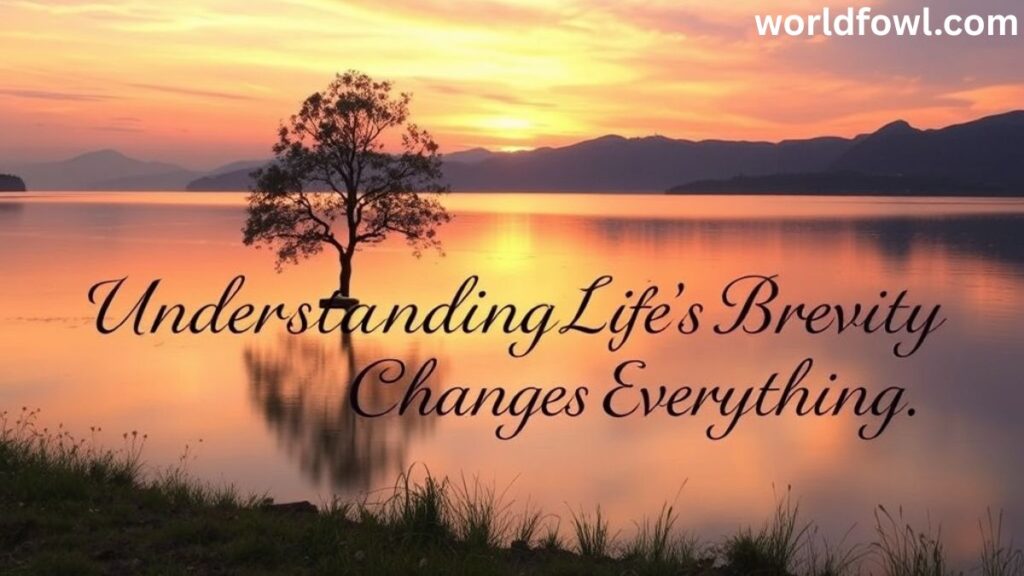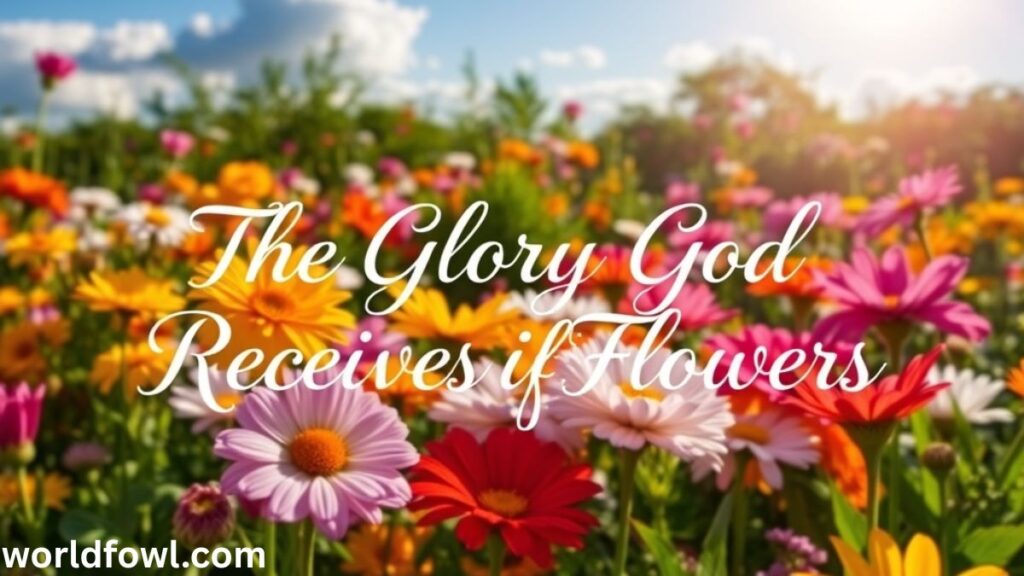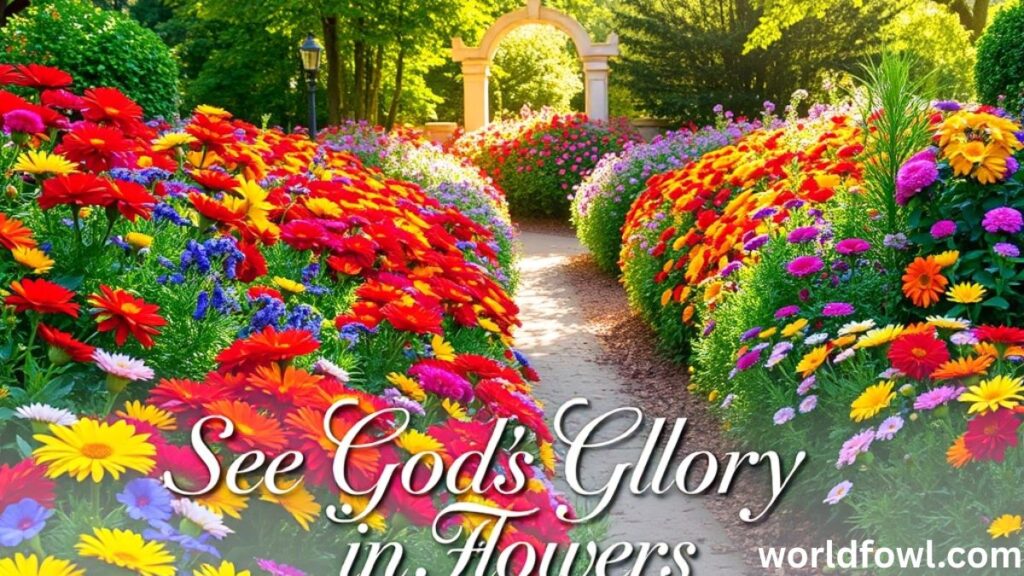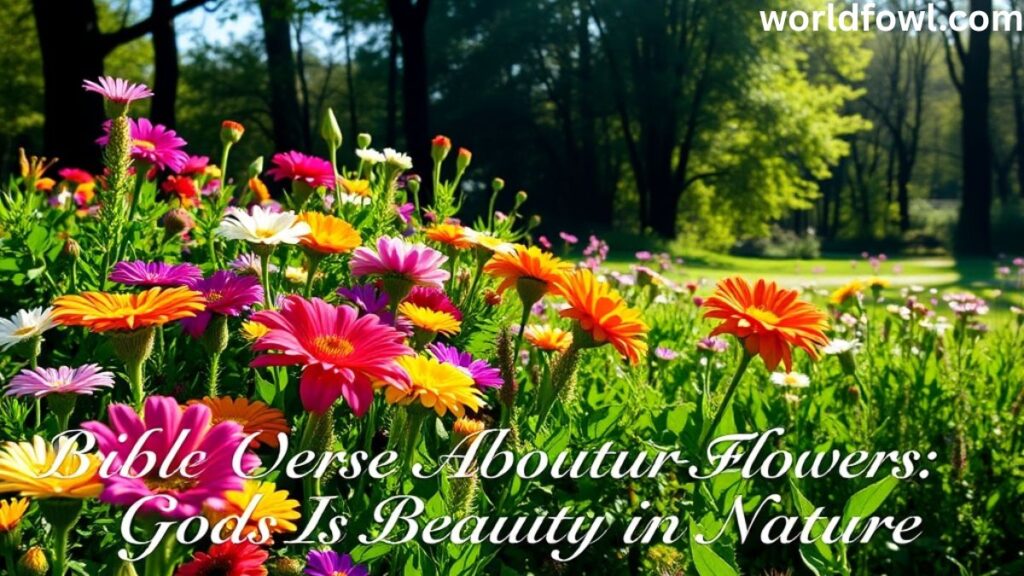Bible verses about flowers reveal how God uses nature’s most delicate creations to teach profound spiritual truths.Bible Verses About Flowers: God’s Beauty in Nature Throughout Scripture, flowers appear as divine illustrations of God’s care, provision, and eternal glory. These passages showcase God’s beauty in nature as intentional divine artistry—each bloom carrying messages about faith, mortality, and renewal.
Wildflowers scattered across ancient fields weren’t mere decoration. Jesus pointed to them as living proof that worry is unnecessary. Bible Verses About Flowers: God’s Beauty in Nature The lilies He referenced outshone Solomon’s royal splendor without striving or effort. Flowers preach sermons about trust in God’s provision more powerfully than human words ever could.
From the fleeting grass that withers to the crocus bursting through desert soil, biblical symbolism of flowers connects physical beauty to eternal realities. These verses transform ordinary blooms into extraordinary teachers. They remind us that God’s glory revealed in creation surrounds us daily, waiting to deepen our understanding of His character. Nature becomes divine inspiration when viewed through Scripture’s lens.
Flowers Show God’s Care for His Creation
Matthew 6:28-30 (NIV) delivers one of Scripture’s most memorable lessons about divine care:
“And why do you worry about clothes? See how the flowers of the field grow. They do not labor or spin. Yet I tell you that not even Solomon in all his splendor was dressed like one of these. If that is how God clothes the grass of the field, which is here today and tomorrow is thrown into the fire, will he not much more clothe you—you of little faith?”
Jesus wasn’t giving a botany lesson here. He was demolishing anxiety at its roots.
Think about what He’s saying. Solomon—the wealthiest king in Israel’s history—couldn’t match the elegance of a simple wildflower. His robes of purple and gold, his crown encrusted with jewels, his entire wardrobe assembled by the finest craftsmen? None of it compared to what God casually creates in a field.
This passage reveals something stunning about God’s provision. If He lavishes such attention on flowers that bloom for a season and then wither, how much more will He care for you? You’re not grass destined for the fire. You’re His beloved child.
Faith in God’s provision isn’t about pretending problems don’t exist. It’s about recognizing the generous character of the One who created nature’s beauty. When worry creeps in—about bills, health, relationships, or the future—remember those lilies. They don’t strategize or stockpile. They simply receive what their Creator provides.
Practical Lessons from the Flowers
The flowers teach us several concrete truths about God’s care:
- Divine attention to detail: God doesn’t mass-produce generic blooms. Each petal, each fragrance, each hue reflects intentional design.
- Provision without striving: Wildflowers don’t work themselves into exhaustion. They grow according to their nature.
- Beauty as gift: These blooms don’t earn their splendor through performance. It’s given freely.
- Trust over anxiety: If God maintains such care for temporary grass, your needs won’t escape His notice.
| Biblical Principle | What Flowers Teach Us | How to Apply It |
|---|---|---|
| God’s provision | Flowers receive everything they need naturally | Stop striving; start trusting |
| Divine creativity | No two flowers are exactly identical | You’re uniquely valued |
| Generous care | Even temporary blooms get God’s attention | Your eternal life matters infinitely more |
| Beauty without labor | Flowers don’t earn their petals | God’s gifts come from grace, not achievement |
This isn’t passive theology. It’s an invitation to radical trust in God. When you see a flower, let it trigger a reminder: the same Creator who painted those petals is actively caring for you.
Flowers Represent the Shortness of Life
Psalm 103:15-16 (NIV) confronts us with uncomfortable truth:
“The life of mortals is like grass, they flourish like a flower of the field; the wind blows over it and it is gone, and its place remembers it no more.”
Harsh? Maybe. But necessary.
Then reality intrudes—a diagnosis, a loss, a sudden goodbye—and we remember what the psalmist knew: human mortality is real.
Flowers don’t pretend they’ll last forever. They bloom gloriously, fully present in their season. Then they fade. There’s no denial, no bargaining. Just honest transience.
Isaiah 40:8 (NIV) builds on this theme with a crucial contrast:
“The grass withers and the flowers fall, but the word of our God endures forever.”
Here’s where the metaphor deepens. Yes, we’re fleeting like flowers. Our bodies age, our strength diminishes, our time runs out. But this shortness of life isn’t the whole story.
While flowers fade, God’s word endures forever. While our physical existence is temporary, we can anchor ourselves to something eternal. The promises God makes don’t expire. His character doesn’t decay. His love doesn’t wither.
Understanding Life’s Brevity Changes Everything

Recognizing life’s fleeting nature isn’t depressing—it’s liberating. Consider what changes when you really grasp this truth:
You prioritize differently. Trivial conflicts shrink. Petty grudges seem absurd. What matters becomes crystal clear.
You forgive faster. When you realize how brief this life is, holding onto bitterness feels like wasting grass before it withers.
You love more boldly. Why hold back affection when you understand how quickly seasons pass?
You invest in eternal things. Money, status, possessions—they’re all grass that withers. Relationships, character, faith—these connect to what endures.
“Teach us to number our days, that we may gain a heart of wisdom.” — Psalm 90:12
The flowers don’t mourn their brief existence.
The Withering Grass Metaphor in Context
The grass withers imagery appears throughout Scripture, always pointing to the same reality:
- Human life is temporary compared to God’s eternity
- Physical beauty and strength eventually fade
- Eternal life and God’s promises outlast our fleeting existence
- What we build on earth doesn’t compare to eternal things
This isn’t nihilism. It’s perspective. When you understand the shortness of human life, you stop sweating small stuff. You focus on what transcends the field where grass grows and dies.
Flowers Symbolize Renewal and Joy
After confronting mortality, Scripture pivots to hope. Flowers don’t just wither—they return. Blossoms break through winter soil. Life reasserts itself.
Song of Solomon 2:12 (NIV) captures this beautifully:
“Flowers appear on the earth; the season of singing has come, the cooing of doves is heard in our land.”
This isn’t just romantic poetry (though it’s definitely that). It’s theology disguised as nature observation. Flowers mark transition—winter’s death giving way to spring’s vitality. Silence breaking into song. Dormancy exploding into life.
The appearance of flowers signals something beyond themselves. They announce that seasons have shifted. Joy is possible again. New beginnings have arrived.
Isaiah 35:1-2 (NIV) extends this imagery with prophetic power:
“The desert and the parched land will be glad; the wilderness will rejoice and blossom. Like the crocus, it will burst into bloom; it will rejoice greatly and shout for joy.”
Deserts don’t naturally bloom. That’s the point. When Isaiah speaks of wilderness blossoming, he’s describing divine intervention. He’s pointing to spiritual renewal that defies natural limits.
The crocus appears specifically here—one of the earliest spring flowers, often pushing through snow. It’s a perfect symbol for hope in impossible circumstances. Where everything looks dead, where conditions seem hostile, suddenly there’s life. Color. Fragrance. Beauty.
What Renewal Looks Like
Flowers teach us what renewal through God’s love actually means:
It’s often unexpected. You don’t see the bulb underground preparing to bloom. Renewal frequently surprises us.
It takes time. Blossoming doesn’t happen instantly. There’s a process—roots deepening, stems strengthening, buds forming.
It defies circumstances. Wildflowers grow in sidewalk cracks. Renewal isn’t about perfect conditions; it’s about divine life breaking through.
It brings joy. When flowers appear, spirits lift. Renewal and joy in God’s presence are inseparable.
Biblical Patterns of Renewal
| Season of Life | What Dies or Fades | What Blooms |
|---|---|---|
| Personal crisis | Old securities and certainties | Deeper faith in God’s provision |
| Loss or grief | Previous expectations | Hope rooted in God’s promises |
| Spiritual dryness | Religious routine | Authentic joy and peace in faith |
| Failure or sin | Self-righteousness | Gratitude for God’s creation and grace |
The flowers don’t force their blossoming. They respond to light, to warmth, to seasons ordained by their Creator. Similarly, spiritual renewal and growth isn’t something you manufacture. It’s what happens when you position yourself toward God’s light and let His life flow through you.
Renewal through God’s love means you’re not stuck in winter. New beginnings are possible. The desert can bloom. Your barren places can explode with crocus beauty.
Flowers as a Sign of God’s Glory
Luke 12:27 (NIV) echoes Matthew’s earlier teaching with slight variation:
“Consider how the wild flowers grow. They do not labor or spin. Yet I tell you, not even Solomon in all his splendor was dressed like one of these.”
That word “consider” is crucial. Jesus isn’t saying, “Glance at flowers.” He’s saying, “Study them. Meditate on them. Let their lesson sink deep.”
What happens when you really consider a wildflower? You notice intricate details—veins in petals, gradients of color, perfectly formed stamens. You realize this beauty serves no utilitarian purpose. The flower isn’t beautiful because beauty helps it survive. It’s beautiful because its Creator is an artist.
This is divine artistry made visible. Every bloom is a signature. Every field of wildflowers is a gallery displaying God’s glory revealed in creation.
Hosea 14:5-6 (NIV) uses flower imagery to describe God’s relationship with His people:
“I will be like the dew to Israel; he will blossom like a lily. Like a cedar of Lebanon he will send down his roots; his young shoots will grow. His splendor will be like an olive tree, his fragrance like a cedar of Lebanon.”
Notice the progression. God provides (like dew). Israel responds (blossoming like a lily). Deep growth happens (roots like cedar). Splendor and fragrance result.
This isn’t just about looking pretty. Flowers produce fragrance—they affect their environment. When you bloom spiritually, you don’t just change personally; you influence everything around you.
The Glory God Receives from Flowers

Flowers glorify God in ways that preach without words:
They display His creativity. No two species identical. Endless variation. Infinite imagination.
They reveal His generosity. God didn’t create a beige world. He painted it with petals.
They demonstrate His attention. Even the smallest wildflower receives intricate design.
They reflect His character. Beauty, joy, renewal—these aren’t accidents. They’re attributes of the Creator showing up in creation.
When you encounter flowers, you’re not just seeing plants. You’re witnessing God’s glory in the natural world. You’re observing magnificence that points beyond itself.
Practical Ways to See God’s Glory in Flowers

Here’s how to let flowers deepen your faith:
- Pause regularly. Don’t just rush past blooms. Stop. Observe. “Consider” as Jesus instructed.
- Photograph them. Capturing beauty trains you to notice it more often.
- Garden intentionally. Growing flowers becomes Christian meditation on nature.
- Share them. Giving someone flowers is sharing God’s glory with them.
- Let them prompt worship. When you see a stunning bloom, let it trigger gratitude for God’s creation.
“The heavens declare the glory of God; the skies proclaim the work of his hands.” — Psalm 19:1
If skies declare God’s glory, so do flowers. They’re part of the same proclamation—nature as divine inspiration, creation as continuous worship service.
Deepening Your Understanding of Flowers in Scripture
Biblical symbolism of flowers extends beyond the specific verses we’ve explored. Throughout Scripture, flowers appear in contexts that reveal layers of meaning:
In the tabernacle, craftsmen carved flower designs into gold lampstands and woven them into priestly garments. Beauty wasn’t frivolous—it was central to worship.
In prophecy, blossoming often signals restoration. When Israel returns from exile, prophets describe the land blooming again.
In wisdom literature, flowers illustrate countless lessons about mortality, beauty, and divine care.
Why This Matters Today
You might wonder whether contemplating flowers is practical. The world faces serious problems. Shouldn’t we focus on those?
But here’s the thing: Christian reflections on nature aren’t escapism. They’re foundation. When you lose sight of God’s beauty in nature, you lose perspective on everything else.
Flowers remind you that:
- Beauty matters. It’s not indulgent; it’s essential.
- Divine care extends to details. Nothing’s beneath God’s notice.
- Temporary things have value even though they’re fleeting.
- Eternal things provide the only lasting anchor.
Case Study: The Lily
The lily appears repeatedly in Scripture, always carrying significance. Jesus chose it specifically as His teaching illustration. Why?
Lilies grow abundantly in Israel, familiar to His audience. They’re strikingly beautiful yet common. They require specific conditions to thrive but appear effortless once blooming. They’re fragile—a hard rain damages them—yet they return season after season.
Lily symbolism encompasses purity, beauty, and trust in divine provision. When Jesus says “consider the lilies,” He’s pointing to something everyone recognizes yet rarely deeply considers.
Modern botanists debate which specific flower Jesus referenced. Some argue for wildflowers like anemones, others for actual lilies. But precision isn’t the point. The lesson transcends botany.
Living These Truths Daily

Understanding Bible verses about nature intellectually is one thing. Letting them transform how you live is another.
Morning Practice
Start your day by looking at flowers—in your garden, through your window, in a photo. Let them trigger these thoughts:
“God provides for these blooms. He’ll provide for me today.”
“These flowers are temporary, but God’s word endures forever.”
“This beauty costs the flower nothing. I don’t earn God’s love either.”
Stress Response
When anxiety hits, remember Matthew 6:28-30. Actually picture wildflowers in a field. See them clothed in colors Solomon couldn’t match. Remind yourself: trust in God replaces worry with faith.
Grief Process
When facing loss, Psalm 103:15-16 validates your pain. Yes, life is fleeting like flowers. But this honest acknowledgment of human mortality doesn’t end in despair. It transitions to Isaiah 40:8—God’s promises outlast our transience.
Celebration Moments
When experiencing joy, think of Song of Solomon 2:12. Flowers appearing signals seasons of singing. Your joy isn’t random; it’s part of creation’s rhythm of renewal and joy.
conclusion
Bible verses about flowers remind us that God’s beauty in nature isn’t accidental—it’s intentional revelation. Every petal, every bloom, every wildflower carries divine messages about trust, renewal, and eternal life. When you notice flowers, you’re witnessing God’s glory displayed in the smallest details of creation.Bible Verses About Flowers: God’s Beauty in Natureb These Scripture passages transform simple observations into profound spiritual lessons.
Bible verses about flowers and God’s beauty in nature invite you into deeper faith through everyday encounters. The lilies still teach about provision.Bible Verses About Flowers: God’s Beauty in Nature The grass still whispers about mortality. The crocus still shouts about hope. Let these biblical truths reshape how you see the world around you. Flowers aren’t just pretty—they’re purposeful testimonies to a Creator who loves beauty, values renewal, and cares deeply for you. Start noticing them.Bible Verses About Flowers: God’s Beauty in Nature Let them draw you closer to God.








